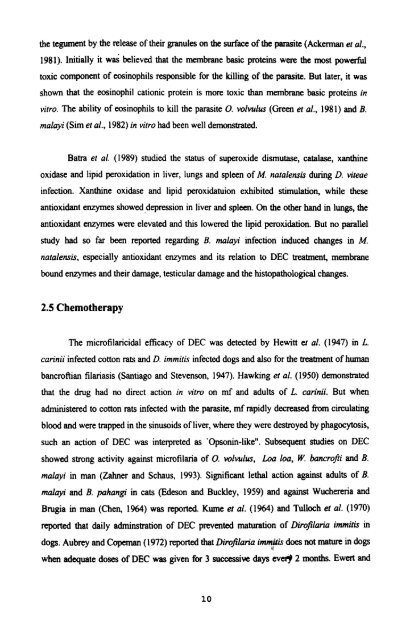effect of infection of the filarial parasite brugia malayi - Pondicherry ...
effect of infection of the filarial parasite brugia malayi - Pondicherry ...
effect of infection of the filarial parasite brugia malayi - Pondicherry ...
You also want an ePaper? Increase the reach of your titles
YUMPU automatically turns print PDFs into web optimized ePapers that Google loves.
<strong>the</strong> tegument by <strong>the</strong> release <strong>of</strong> <strong>the</strong>ir granules on <strong>the</strong> surface <strong>of</strong> <strong>the</strong> <strong>parasite</strong> (Ackerman et al.,<br />
1981). Initially it w& believed that <strong>the</strong> membrane basic proteins were <strong>the</strong> most powerful<br />
toxic component <strong>of</strong> eosinophils responsible for <strong>the</strong> killing <strong>of</strong> <strong>the</strong> <strong>parasite</strong>. But later, it was<br />
shown that <strong>the</strong> eosinophil cationic protein is more toxic than membrane basic proteins in<br />
vitro. The ability <strong>of</strong> eosinophils to kill <strong>the</strong> <strong>parasite</strong> 0. volvulus (Green et al., 1981) and B.<br />
<strong>malayi</strong> (Sim et al., 1982) in vitro had been well demonstrated.<br />
Batra et al. (1989) studied <strong>the</strong> status <strong>of</strong> superoxide dismutase, catalase, xanthine<br />
oxidase and lipid peroxidation in liver, lungs and spleen <strong>of</strong> M, natalensis during D. viteae<br />
<strong>infection</strong>. Xanthine oxidase and lipid peroxidatuion exhibited stimulation, while <strong>the</strong>se<br />
antioxidant enzymes showed depression in liver and spleen. On <strong>the</strong> o<strong>the</strong>r band in lungs, <strong>the</strong><br />
antioxidant enzymes were elevated and this lowered <strong>the</strong> lipid peroxidation. But no parallel<br />
study had so far been reported regarding B. <strong>malayi</strong> <strong>infection</strong> induced changes in M.<br />
natalensis, especially antioxidant enzymes and its relation to DEC treatment, membrane<br />
bound enzymes and <strong>the</strong>ir damage, testicular damage and <strong>the</strong> histopathological changes.<br />
2.5 Chemo<strong>the</strong>rapy<br />
The micr<strong>of</strong>ilaricidal efficacy <strong>of</strong> DEC was detected by Hewitt et al. (1947) in L.<br />
carinii infected cotton rats and D. immitis infected dogs and also for <strong>the</strong> treatment <strong>of</strong> human<br />
bancr<strong>of</strong>tian filariasis (Santiago and Stevenson, 1947). Hawking et al. (1950) demonstrated<br />
that <strong>the</strong> drug had no direct action rn vitro on mf and adults <strong>of</strong> L. carinii. But when<br />
administered to cotton rats infected with <strong>the</strong> <strong>parasite</strong>, mf rapidly decreased from circulating<br />
blood and were trapped in <strong>the</strong> sinusoids <strong>of</strong> liver, where <strong>the</strong>y were destroyed by phagocytosis,<br />
such an action <strong>of</strong> DEC was interpreted as 'Opsonin-like". Subsequent studies on DEC<br />
showed strong activity against micr<strong>of</strong>tlaria <strong>of</strong> 0. wlvulus, Loa loa, W. bancr<strong>of</strong>ti and B.<br />
<strong>malayi</strong> in man (Zahner and Schaus. 1993). Significant lethal action against adults <strong>of</strong> B.<br />
<strong>malayi</strong> and B. pahangi in cats (Edeson and Buckley, 1959) and against Wuchereria and<br />
Brugia in man (Chen, 1964) was reported. Kume et al. (1964) and Tulloch et al. (1970)<br />
reported that daily adminstration <strong>of</strong> DEC prevented maturation <strong>of</strong> Dir<strong>of</strong>ilnria immitis in<br />
dogs. Aubrey and Copeman (1972) reported that Dirojlaria imm? does not mature in dogs<br />
when adequate doses <strong>of</strong> DEC was given for 3 successive days ev@ 2 months. Ewert and

















